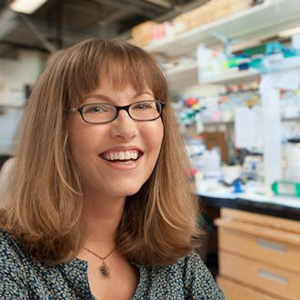Alisa Huffaker Receives 2020 CAREER Award from National Science Foundation
November 20, 2020
By Mario Aguilera and NSF

Alisa Huffaker, an assistant professor in the UC San Diego Biological Sciences Section of Cell and Developmental Biology, has been honored with a prestigious early career award.
A plant biologist, Huffaker was named to the National Science Foundation's (NSF) 2020 class of Faculty Early Career Development (CAREER) Program recipients. Noting that activities pursued by early-career faculty should build a firm foundation for a lifetime of leadership in integrating education and research, NSF describes CAREER awards as the "most prestigious awards in support of early-career faculty who have the potential to serve as academic role models in research and education and to lead advances in the mission of their department or organization."
Huffaker, who joined UC San Diego in 2014, conducts research on key immune signals, signal transduction cascades and disease resistance using Arabidopsis and maize as primary model systems. Applying diverse multi-omic techniques, genetic mapping and the creation of targeted genetic resources, she investigates plant immunity and tolerance of nutrient and drought stress.
Huffaker's CAREER award will fund a five-year project on improving plant resistance. Through integrated biochemical and genetic approaches, her lab will define mechanisms by which newly discovered regulatory proteins modulate biotic and abiotic stresses. The effort seeks a better understanding of layered signaling mechanisms that reconfigure phenotypes and targeted strategies for improving plant resistance.
The award also funds creation of the new Research Opportunities and Orientation for Transfer Students (ROOTS) program to enhance first-generation transfer student retention in the sciences by providing training in laboratory techniques and facilitating placement as undergraduate researchers in UC San Diego Biological Sciences laboratories.
Earlier this year, Huffaker's laboratory reported the discovery of a critical "on-off" switch in the plant immune response system. As described July 20 in their report published in Nature Plants, Huffaker and her colleagues identified a new regulatory switching mechanism—an RNA-binding protein—that helps turn on immune responses a few minutes after attack. Hours later, the switch follows with a deactivation "off" signal to avoid self-inflicted damage to the plant.
In a separate line of collaborative research, Huffaker's lab also defined the genetic basis of a long-hidden layer of maize immunity, describing an unusual biosynthetic hourglass pathway in which in vivo enzyme promiscuity and combinatorial chemistry produce a surprisingly complex array of small molecule antibiotics.
The work follows pioneering early discoveries made by Huffaker in her thesis work and federal research efforts (http://www.plantphysiol.org/content/156/4/2082; https://www.pnas.org/content/110/14/5707).
